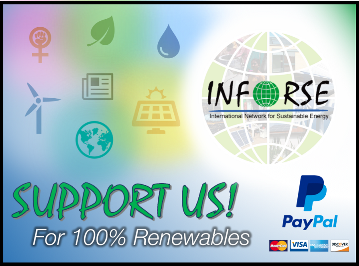|
|
|
|
|
|
|
|
|
|
|
|
|
|
|
|
|
|
|
|
|
| Follow Us: |
| The Climate Convention: Hard Discussions | |
| Ahead for Buenos Aires, November 1998 | |
| The 4th Conference of the Parties (COP4) to the Climate Convention will take place in Buenos Aires in November, 1998. This meeting will pave the way for participating countries to ratify the Kyoto Protocol by 1999. A preparatory meeting for COP4 was held in Bonn during June this year. Four main issues were discussed: * flexible mechanisms: emissions trading, joint implementation, and the clean development mechanism; * sinks of greenhouse gases; * review of adequacy of commitments; * developing-country participation. The review of adequacy of commitments and developing-country participation were the most controversial elements of the talks in Bonn. Disputes over these issues threaten to derail the Kyoto Protocol. Progress of the Convention towards its ultimate objective (i.e., to prevent dangerous, man-made climate change) is measured through reviews, including a review of adequacy of commitments. Currently, the only agreed-upon commitment is that industrialised countries should stabilize their greenhouse gas emissions at 1990 levels by 2000. The first review of these commitments underscored their inadequacy to reach this goal. It is of paramount importance that the second review, to take place no later than December, 1998, get these countries back on track to meet their existing commitments. Beyond this, the review must set out a vision for the future of the Convention. | |
| Controversy over Review | |
| While all participating countries agree that the current commitments are inadequate, there was considerable controversy over what the objective of the review should be. Some industrialized countries, e.g., Australia and the US, saw the review as an opportunity for introducing new commitments for developing countries. The US even threatened not to ratify the Kyoto Protocol if no commitments are made by developing countries and is increasingly pressing developing countries to take on voluntary commitments to limit their low greenhouse gas emissions. This position was hotly contested by the coalition of developing countries known as “G77 & China”, who stated that “COP4 must not be distracted from carrying out the review by the introduction of any extraneous matters such as the consideration of new commitments for Parties not included in Annex 1' (i.e., developing countries). The growing tensions between the developed and developing world threaten ratification of the Kyoto Protocol. A proactive strategy is required to break the deadlock. | |
| Future Emission-Reduction Targets: NGO Proposals | |
| Solutions put forward by NGOs at Bonn aimed to stabilize greenhouse gas concentrations at a safe level in accordance with the Climate Convention. According to these proposals, a global greenhouse gas emissions budget must be calculated first, and then the budget must be shared equitably among the world’s nations on an equal per-capita basis. Progressively stronger emission-reduction targets will be difficult for industrialized countries to accept politically. However, the reduction targets could be negotiated in successive commitment periods and can be phased in over time, allowing countries to move steadily towards their equitable share. The review of commitments provides an opportunity to set stronger emission-reduction targets for industrialized countries in the future, to address equity concerns of developing countries, and to reinject the science into the process. | |
| Developing-Country Participation | |
| The Convention explicitly recognizes that social development and eradication of poverty are the first and overriding priorities of the developing country Parties. Industrialized countries must take the lead in combating climate change and its impacts. Following articles 4.8 and 4.9 of the Convention and 2.3 and 3.14 of the Kyoto Protocol, COP4 aims to significantly further discussions of strategies to meet the needs of developing countries that arise from the adverse effects of climate change and/or from the implementation of response measures. Several developing countries are showing considerable interest in one of the flexible mechanisms generated by the Kyoto Protocol, known as the Clean Development Mechanism (CDM). This may provide direct benefits to developing countries as well as help to avert dangerous climate change. However, it has significant drawbacks which may undermine this objective. | |
| Intervals for Future Reviews of Commitments | |
| The Convention states that review of the commitments shall take place at regular intervals determined by the COP until the objective of the Convention is met. A decision by COP4 on this issue is extremely important for future climate negotiations. If reviews were carried out in the year preceding the termination of each commitment period, as suggested by some in Bonn, there would not be enough time to take appropriate action based on the outcome of the review. A more frequent review process will be needed. | |
| Conclusion | |
| Early ratification of the Kyoto Protocol is of paramount importance, and potentially damaging loopholes must be closed. Parties must actively pursue implementation of their commitments under the Convention, since several developed countries look likely to overshoot their 1990 levels by the year 2000. If the ultimate objective of the Convention is to be met, there must be consideration of the longer term. In the future, progressively stronger reduction targets for industrialised countries will be needed, which should include a limit on global greenhouse-gas emissions and equitable distribution of fossil-fuel consumption. | |

| |
| Published in Sustainable Energy News |
|
|
Go back to main page of ISSUE #22, Sustainable Energy News (16 pages) (1998-09-01) |
|
| Related Publications | |
| Climate change/Global warming/Air pollution | |
| Fresh Air in Buenos Aires? | |
| Contact | |
| |
INFORSE Secretariat Klosterport 4F, 1. floor DK-8000 Aarhus C Denmark Phone: +45 86 22 70 00 Twitter: INFORSE_org Facebook: INFORSE Web: inforse.org E-mail: ove@inforse.org |
